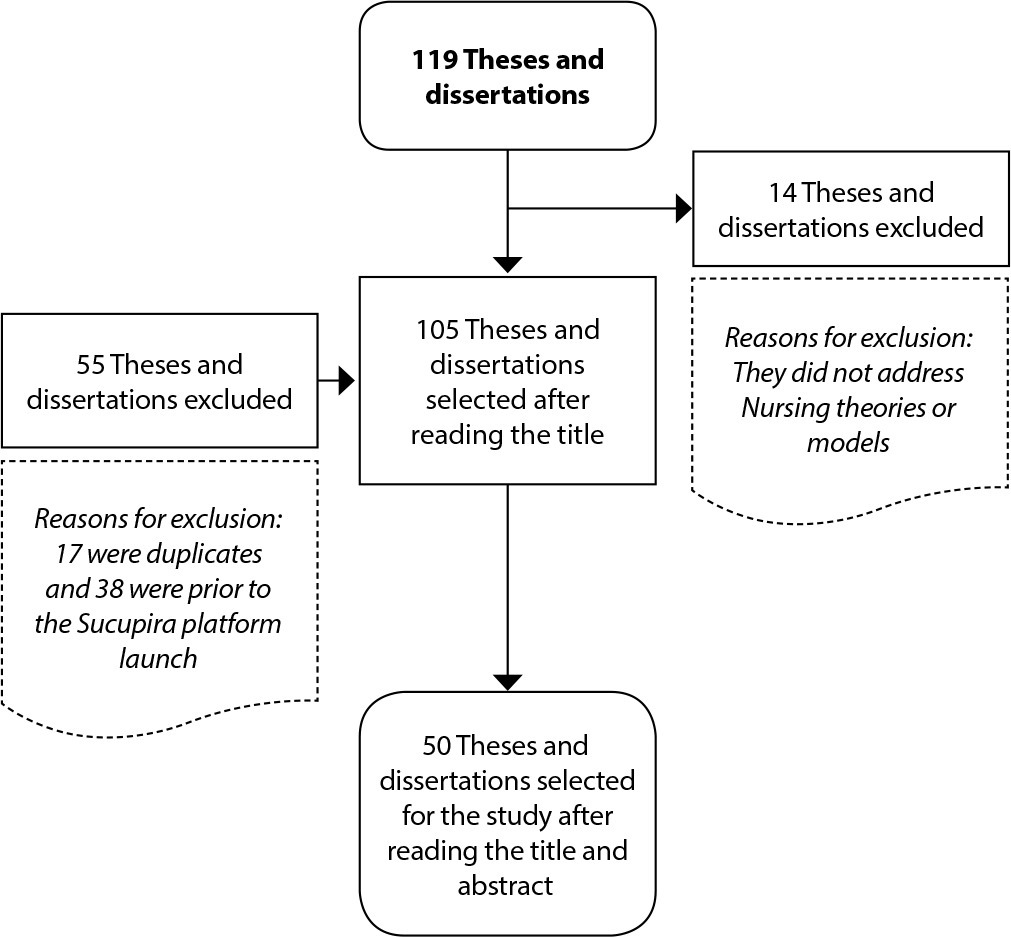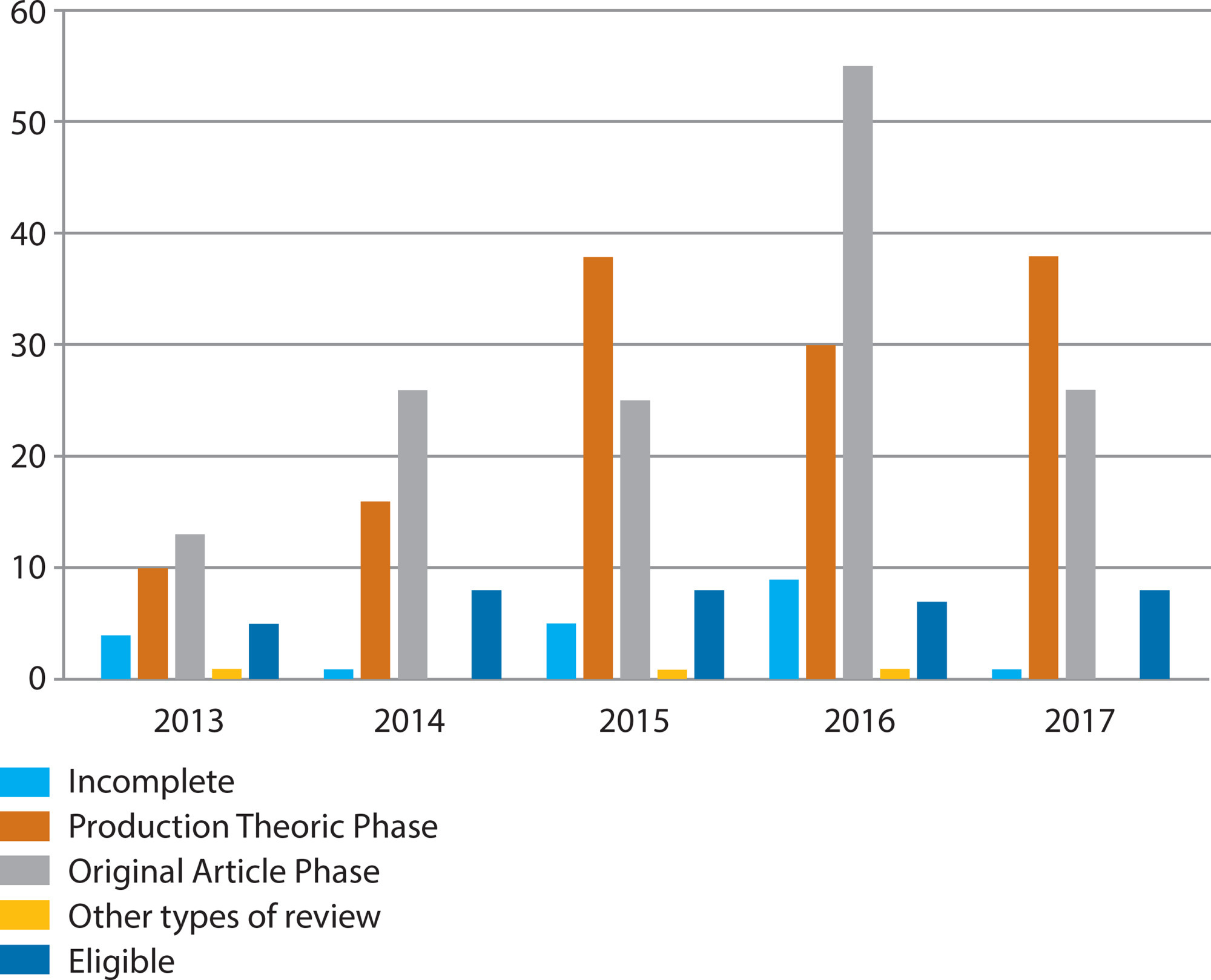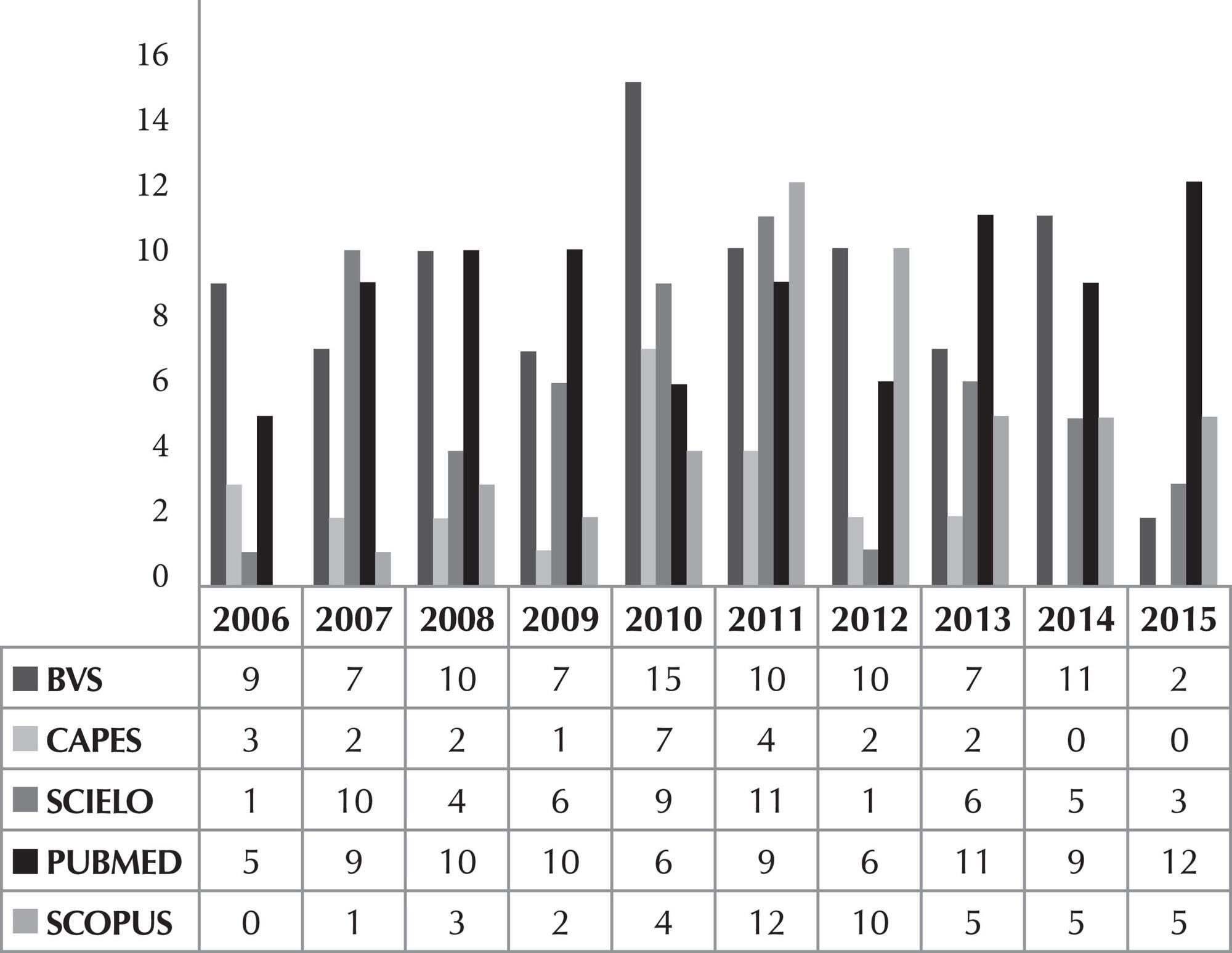-
REVIEW
Brazilian nursing specific situation, middle and micro-range theories: a bibliometric study
Revista Brasileira de Enfermagem. 2024;77(4):e20230520
09-20-2024
Resumo
REVIEWBrazilian nursing specific situation, middle and micro-range theories: a bibliometric study
Revista Brasileira de Enfermagem. 2024;77(4):e20230520
09-20-2024DOI 10.1590/0034-7167-2023-0520
Visualizações0ABSTRACT
Objectives:
to map the nursing theories developed in stricto sensu graduate programs in nursing in Brazil.
Methods:
a bibliometric study, carried out on the Coordination for the Improvement of Higher Education Personnel Theses and Dissertations Portal in October 2023. The controlled descriptors “Nursing Theory” and “Nursing Models” and the uncontrolled descriptors “Theories” and “Middle-Range Theory” were used. Selected studies were cataloged for analysis, which was conducted by the study authors, who have a doctoral degree and expertise in research on nursing theories.
Results:
thirty-nine nursing theories were mapped, with a predominance of middle-range theories (79.5%), focusing on nursing diagnostic concepts and use of the theoretical-methodology strategy of theoretical-causal validity.
Conclusions:
the study identified nursing theories developed in Brazil, recognizing trends, development strategies, theorized objects of disciplinary interest and investments necessary for practical application in Brazilian contexts.
Palavras-chave: BibliometricsHealth Postgraduate ProgramsNursing ModelsNursing ResearchNursing TheoryVer mais
-
ORIGINAL ARTICLE
Nursing Theories and Models as theoretical references for Brazilian theses and dissertations: a bibliometric study
Revista Brasileira de Enfermagem. 2022;75(4):e20210201
03-30-2022
Resumo
ORIGINAL ARTICLENursing Theories and Models as theoretical references for Brazilian theses and dissertations: a bibliometric study
Revista Brasileira de Enfermagem. 2022;75(4):e20210201
03-30-2022DOI 10.1590/0034-7167-2021-0201
Visualizações0ABSTRACT
Objectives:
to map the use of Nursing models and theories utilized as theoretical references in graduate academic Nursing research in Brazil.
Methods:
bibliometrics, performed in the Theses and Dissertations database of the Coordination for the Improvement of Higher Education Personnel, in November, 2020. Data analysis was performed using simple descriptive statistics and lexical analysis, performed using the software: IRAMUTEQ.
Results:
the 50 selected studies were from the field of Nursing, 15 (30%) of which were theses and 35 (70%) were dissertations. 13 Nursing theories and models were identified, used as theoretical references, highlighting Roy’s Adaptation Model in 10 (20%) of the researches. Final Considerations: the study found a great diversity in the use of nursing theories and models as a theoretical framework, which allowed us to identify the areas most researched by nurses and confirmed their application in different specialties and health contexts.
Palavras-chave: BibliometricsModelsNursingNursing Methodology ResearchNursing ResearchNursing TheoryVer mais
-
ORIGINAL ARTICLE
Integrative reviews in Brazilian nursing postgraduation programs: a bibliometric study
Revista Brasileira de Enfermagem. 2020;73(suppl 6):e20190441
12-21-2020
Resumo
ORIGINAL ARTICLEIntegrative reviews in Brazilian nursing postgraduation programs: a bibliometric study
Revista Brasileira de Enfermagem. 2020;73(suppl 6):e20190441
12-21-2020DOI 10.1590/0034-7167-2019-0441
Visualizações0Ver maisABSTRACT
Objectives:
to analyze the Brazilian scientific integrative review production in postgraduation nursing programs.
Methods:
bibliometric design, carried out in the database of dissertations and theses of the Coordination for the Improvement of Higher Education Personnel, in October 2018.
Results:
35 dissertations and 1 thesis were found. Most studies were carried out at the University of São Paulo; the main methodological reference was Mendes, Silveira and Galvão (2008); for data collection, it was Ursi (2005). The most used database was CINAHL, followed by LILACS and PubMed. The period of publication varied from 5 to 30 years; and the sample, from 6 to 299 texts. Some studies did not mention keywords, data collection period, exclusion criteria or publishing period.
Conclusions:
despite the growing popularity of integrative review studies, they are undervalued in the stricto sensu postgraduation program in nursing and there are shortcomings in the implementation of the method, related to the absence of important elements.

-
RESEARCH
Brazilian nursing journals: strengths, weaknesses and challenges
Revista Brasileira de Enfermagem. 2018;71(5):2489-2495
01-01-2018
Resumo
RESEARCHBrazilian nursing journals: strengths, weaknesses and challenges
Revista Brasileira de Enfermagem. 2018;71(5):2489-2495
01-01-2018DOI 10.1590/0034-7167-2017-0828
Visualizações0Ver maisABSTRACT
Objective:
To evaluate, qualitatively, the Brazilian nursing journals and identify their strengths and weaknesses when compared to international journals in the area.
Methods:
A historic approach regarding the period from 2012 to 2016. We included national nursing journals indexed in the SciELO Database and international journals with an impact factor above 1.0 and below 1.8 indexed in the WoS and Scopus databases.
Results:
The national journals met SciELO requirements for internationalization and obtained visibility when they were included in international indexing bases. Their citations were mostly national, with the following mean values: 86% in Portuguese; 12% in Spanish and 2% in English.
Conclusion:
The excellence requirements of the national journals are being accomplished. The publication of articles in Spanish can impact on the increase of bibliometric indicators.
-
RESEARCH
Scientific production of the International Classification for Nursing Practice: a bibliometric study
Revista Brasileira de Enfermagem. 2018;71(6):2860-2868
01-01-2018
Resumo
RESEARCHScientific production of the International Classification for Nursing Practice: a bibliometric study
Revista Brasileira de Enfermagem. 2018;71(6):2860-2868
01-01-2018DOI 10.1590/0034-7167-2017-0411
Visualizações0Ver maisABSTRACT
Objective:
To describe the scientific production of the International Classification for Nursing Practice throughout dissertations and theses published by nurses in Brazil from 1996 to 2016.
Method:
A bibliometric, descriptive, quantitative documentary study, carried out from October/2015 to July/2016 on the sites of the Center of Studies and Research in Nursing (CEPEn), at the thesis and dissertation banks of the Coordination of Improvement of Higher Education Personnel and of the Plataforma Sucupira (Sucupira Platform).
Results:
There were 108 productions, 30 theses and 78 dissertations. In 2014, there was the largest number of publications (19). The Graduate Program in Nursing of the Universidade Federal da Paraíba had the highest number of productions (23). Regarding the theme, the use in clinical practice was highlighted (69), followed by the elaboration of terminology subsets (17).
Conclusion:
The Brazilian scientific production setting on ICNP® is expressive, evidencing this system as a tool that allows the provision of systematic care.

-
REVISÃO
Nursing higher education in MERCOSUR: a bibliometric study
Revista Brasileira de Enfermagem. 2018;71(suppl 4):1732-1739
01-01-2018
Resumo
REVISÃONursing higher education in MERCOSUR: a bibliometric study
Revista Brasileira de Enfermagem. 2018;71(suppl 4):1732-1739
01-01-2018DOI 10.1590/0034-7167-2017-0405
Visualizações0Ver maisABSTRACT
Objective:
to identify productions that approach nursing high education in member states of MERCOSUR.
Method:
bibliometric study with quantitative approach carried out in search mechanisms, such as BVS, Capes, SciELO, Scopus and PubMed, between 2006 and 2015. It was found 301 articles about nursing education in MERCOSUR.
Results:
point to concern for the nurse’s education for public health policies, for teacher’s education and the teaching-learning process. However, publications regarding technologies associated with distance education on health field are low.
Conclusion:
this study contributes with discussion in nursing education field when points to the themes regarding the production about nurses’ education in MERCOSUR, specially, the range of targets set up in the Educational MERCOSUR agreement.




